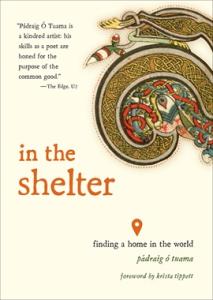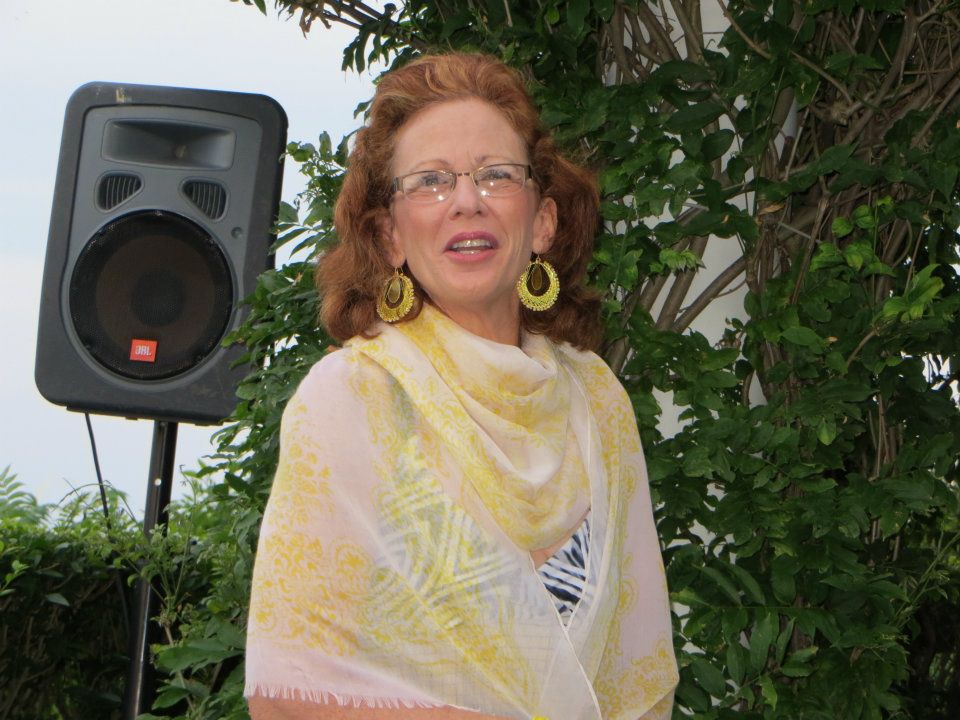 I was on retreat when I wrote this, a fitting capstone to my sabbatical that will be ending before long. I brought five books along with me, one mystery novel and four works of non-fiction of various sorts. One of the non-fiction books is Pádraig Ó Tuama’s In the Shelter. Ó Tuama is an Irish poet, theologian, and conflict resolution specialist of whom I had heard obliquely because of his partnership with Krista Tippett and On Being. In the last month I had been wondering what book I should focus my attention on for my four day retreat, then on consecutive days I heard Pádraig Ó Tuama interviewed on the podcast “The Bible for Normal People,” followe the next day by his being a featured storyteller on The Moth.
I was on retreat when I wrote this, a fitting capstone to my sabbatical that will be ending before long. I brought five books along with me, one mystery novel and four works of non-fiction of various sorts. One of the non-fiction books is Pádraig Ó Tuama’s In the Shelter. Ó Tuama is an Irish poet, theologian, and conflict resolution specialist of whom I had heard obliquely because of his partnership with Krista Tippett and On Being. In the last month I had been wondering what book I should focus my attention on for my four day retreat, then on consecutive days I heard Pádraig Ó Tuama interviewed on the podcast “The Bible for Normal People,” followe the next day by his being a featured storyteller on The Moth.
At the end of his story on The Moth, the host of show mentioned how much she loves Ó Tuama’s work, particularly this short poem:
Narrative Theology #1
And I said to him:
Are there answers to all of this?
And he said:
The answer is in a story
and the story is being told.
And I said:
But there’s so much pain
And she answered, plainly:
Pain will happen.
Then I said:
Will I ever find meaning
And they said:
You will find meaning
where you give meaning.
The answer is in a story
and the story isn’t finished
It was clear to me that this was the author who needed to acompany me on retreat–I have not been disappointed. In the Shelter is a memoir, which fits weel because my two sabbatical books are memoirs of different sorts. Ó Tuama is a beautiful writer, so good that when I tried reading a page or two of a couple of the other non-fiction books I brougt with me, I stopped because they were so wooden and pedantic in style and tone compared to In the Shelter. I’m sure I’ll be referencing this book frequently in the coming weeks.
Early in the book, Ó Tuama tells a brief story about an encounter with a group of Catholic charasmatics in his youth. Since I’ve been in reliationship with a Catholic charasmatic for the last 35 years, the memories started bubbling up. In my life-long spiritual journey, the decade of my twenties was the charismatic decade. No, that was not when I began to develop my current charismatic personality—that’s when I first encountered the Christian charismatic movement. For the uninitiated, the charismatic movement was (and is) marked positively by an infusion of divine energy into churches and denominations that had for too long lived out the negative side of Paul’s observation that “the letter kills, but the spirit gives life.” For those whose whole experience of the Christian faith has been defined by rote repetition of stale and worn out practices and observances, the exuberant and often unpredictable energy of charismatic worship can be both exhilarating and frightening.
My Baptist minister father, who for better and worse was my most important spiritual influence growing up, always considered himself a “maverick” in the McCain tradition, part of the Christian denomination into which he was born and then ordained, but also an outlier pressing against the envelope from inside. This regularly caused problems for him with both the faculty of and the monetary contributors to the small Bible school he had founded and of which he was President. The Bible Institute of New England was barely keeping its head above water in the summer of 1974 when my father and I drove 2300 miles from Vermont to New Mexico as he delivered me to my first semester at St. John’s College in Santa Fe. He frequently fretted during the trip about the financial instability of his Bible school, wondering how much longer it would last.
After leaving me at school, he stayed within a couple hundred miles of Santa Fe for a few days in case I got homesick and didn’t want to stay. During a hike in a Colorado meadow one of those days, he asked God for guidance and peace—in response, as he described it, he received a vivid vision and began ecstatically speaking in a language he did not understand. In charismatic language, he had received the gift of tongues—a powerful sign of the infusion of the Holy Spirit. Not surprisingly, the faculty and financial supporters of the Bible Institute of New England were not ready to get on board with an already-maverick-turned-charismatic President. BINE soon closed its doors and morphed into a retreat/conference center slash place for spiritual misfits to hang out called Winterhill.
I experienced Winterhill for the first time a year later when I returned to Vermont for summer vacation. The get-togethers at Winterhill looked like a tiny version of Woodstock, with hippie-ish twenty and thirty-somethings sitting in a large circle, strumming guitars, banging on drums, shaking tambourines, singing music offensive to my classically trained ear, eyes closed and hands raised, regularly violating the Apostle Paul’s directive that worship should be done “decently and in order.” Worship was interrupted regularly by words of prophecy, speaking in tongues, laying on of hands for all manner of prayer and healing—all benevolently overseen by my father and a few other leaders. It looked just like a sixties love-in, without the drugs and sex (I think).
Winterhill lasted for only a couple of years, but my fringe relationship with the charismatic movement continued for years, from time spent at a large charismatic church in Florida where my father was one of the “elders” to St. Matthew’s Cathedral in Laramie, Wyoming, where I experienced for the first time the dynamic but volatile relationship between charismatic spiritual energies and traditional Episcopal liturgies.

Top it off with being introduced by my parents to a beautiful red-haired force of nature whose dynamic spirituality was shaped by the Catholic charismatic movement in the seventies, and the tension between charismatic life and my own introverted personality and love for traditional liturgy and worship was here to stay. Jeanne is a daily reminder of the power and beauty of charisma at its best, while I carry within me a lived history containing many examples of how the charismatic movement can injure and go wrong.
The charismatic movement takes its name from the Greek word meaning “gift” or “favor,” referring to the gifts of the Holy Spirit mentioned on several occasions in Paul’s letters, including the passage from First Corinthians read at church this morning. Depending on where one looks, there are as many as nine of them, ranging from prophecy and healings to tongues and their interpretation.
In my experience, as soon as people start talking about the gifts of the Spirit, they start ranking them in importance (although Paul does not) and accordingly create a pecking order, seeking as humans often do to harness power by containing it. I have been witness to many arguments between people trying to make sense of what Paul says—churches and denominations have split over this. The problem is that Paul was writing letters, not theological treatises. He’s not always consistent, and much of what he writes is crafted specifically for the people to whom he is writing.
After more than four decades of struggling with charisma and the life of faith, I’ve come to think that the greatest value in thinking and talking about the gifts of the Spirit is psychological rather than doctrinal. Paul always mentions the gifts in the context of the larger community, making clear that no one has all of the gifts, that an individual should not be judged for lacking any of them, but that just as a healthy body needs the active contribution of many parts, so a healthy community of believers requires the active infusion of all of the talents and abilities referenced as “gifts.” Each person’s abilities and talents are uniquely theirs, a part of their spiritual personality.
The important question for each of us to ask is: What do I have to offer? Because I spend most of my life, at work and outside, with words, I’ve started thinking about spiritual gifts and abilities in terms of how we organize and structure our language–punctuation marks. Each punctuation mark plays an important and unique role in the structuring of the written and spoken word. In Writing Tools, Roy Peter Clark offers this quick and snappy reminder of the roles played by the major players:
If a period is a stop sign, then what kind of traffic flow is created by other marks? The comma is a speed bump, the semicolon is what a driver education teacher calls a “rolling stop”; the parenthetical expression is a detour; the colon is a flashing yellow light that announces something important up ahead; the dash is a tree branch in the road.
I leave it to you to decide where the question mark [ ? ] ellipsis [ . . . ] and exclamation point [ ! ] fit in this driving analogy.
Now think about yourself: your personality, your strengths, your weaknesses, what you are the “go to” person for, the things that you know you need help with. If you were a punctuation mark, which one would you be? Which punctuation mark best captures your special contributions to the whole? Think about yourself alone, at work, with your friends, your family, your faith community if you have one. Just as the variety of punctuation marks serves a vast panoply of words and meaning, the vast range of personal strengths and weaknesses, talents and foibles, contribute to the beauty of the human whole. What is your special contribution? Which punctuation mark best captures you?
P.S.: I am a semicolon.













